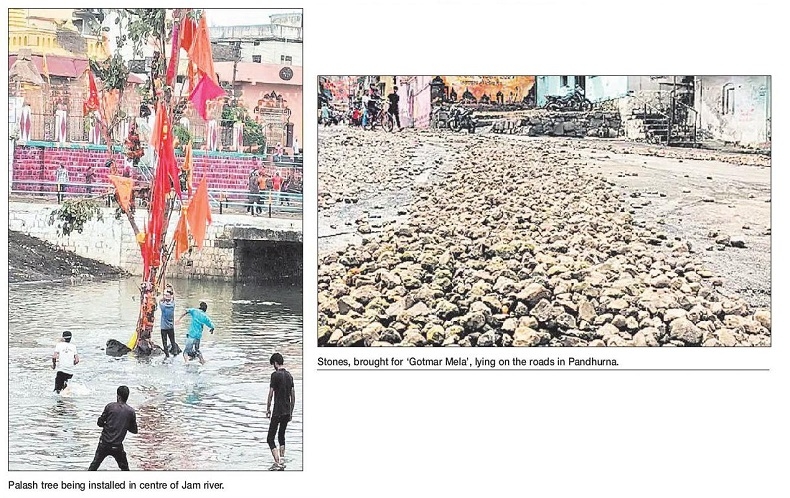TRADITION CONTINUES 615 people injured, 13 critical,in ‘GOTMAR MELA’
04 Sep 2024 12:31:46

Our Correspondent
PANDHURNA,
A TOTAL of 615 people were
injured in the traditional
Gotmar Mela organised here on
Pola on Tuesday morning on
the banks of Jam river. The
Gotmar Mela which started at
10 am on Tuesday lasted till
evening and according to the
local sources, the condition of
13 people is critical. Later, with
mutual concerned flag was
brought to Chandika Mata
Mandir for pujan.
Total four health camps have
also been set-up in the fair. Xrays of 15 people were done.
Among them, 6 people were
found with broken bones in
their hands and legs. All are
being treated in the civil hospital.
As a ritual, people of
Pandhurna and Sawargaon pelt
stones at each other on the
bridge of Jam river.
Interestingly, a youth arrived
wearing a cricket kit to avoid
the stones. This game will continue till late Tuesday evening.
Police force of 6 districts is
deployed in the fair.
‘Gotmar Mela’ started on
Monday and continued for
about 2 hours. When it became
dark, people from both sides
returned to their homes. BMO,
Dr Dipendra Salame said, more
than 10 people were injured
on Monday.
Among these, 4
people are serious. The game
resumed on Tuesday and continued till late evening.
Two stories behind the
‘Gotmar Mela’ and stones were
used in the war. The first story is related to the Pindari (tribal) society. According to ancient
belief, thousands of years ago,
there was an ancient fort of the
Pindari community on the
banks of Jam river, where the
community and their powerful army resided. Its commander was Dalpat Shah. But
the army of the Bhonsale king
of Maharashtra attacked the
fort of the Pindari community. Due to lack of weapons, the
army of the Pindari community attacked with stones. The
Bhonsale king was defeated.
Since then, the tradition of
stone pelting has been going
on here.
It is said that after the war,
the public changed the name
of commander Dalpat Shah to
Raja Jatba Naresh. Even today,
the Samadhi of Jatba Raja is
present here. The area where
the Samadhi is present is registered as Jatba ward in
Pandhurna Municipality.
This
ward has a population of 600
people.
Another story of ‘Gotmar’
narrates that it is played in the
memory of the lovers.
According to the elders, a girl
from Sawargaon and a boy from
Pandhurna were in love. Both
wanted to get married. But the people of both the villages did
not approve of this union. On
the second day of Pola festival,
early morning of
Bhadrapaksha Amavasya, the
boy and the girl eloped. But got
stuck in the flood of Jam river.
Both kept trying to cross the
river. But the people of
Pandhurna and Sawargaon
gathered and started throwing
stones at them, which led to
their deaths. Since then, the
game of ‘Gotmar’ is played in
memory of the lovers.
Additionbally, Kavle family has been installing the flag
for 4 generations. The flag in
the form of Palash has
immense importance in
‘Gotmar Mela’ which is
installed in the middle of the
Jam river. The tradition of
bringing this flag from the forest is being carried on by the
family of Suresh Kavle of
Sawargaon for four generations now.
A year before, a
flag in the form of a palash
tree is marked in the forest. A
day before the Pola festival,
it is brought to Suresh Kavle’s
house. On the day of Gotmar,
early in the morning, that flag
is installed in the Jam river.
The ‘Gotmar Mela’ begins in
the name of Chandi Mata. First
of all, the ‘Gotmar’ players
reach the Chandi Mata temple
and offer prayers. After this, a
tree is planted in the middle of
the Jam river. Then, from both
sides of the culvert, they shower stones on each other.
The Sambar family has lost
3 of its members in the Gotmar
Mela. Mahadev Sambar was
the first to die on August 22,
1955. Kothiram Sambar died on
August 24, 1987 while Janardan
Sambar died on September 4,
2005.
So far 13 people have lost
their lives in these stone peltings.
The administration took
very strict steps to stop the
dangerous game and the
police also fired bullets. This
firing took place in 1978 and
1987, in which Devrao
Sakarde of Brahmani ward
died on September 3, 1978
and Kothiram Sambare of
Jatva ward died due to bullet
injuries in 1987. During this
time, curfew-like conditions
prevailed in Pandhurna.
There was also a lathi charge
by the police.
Chhindwara administration
made a lot of efforts to change
the form of the fair. In 2001, the
administration had laid plastic balls on the Jam river instead
of stones. So that the practice
of stone pelting could be
stopped. But the players playing ‘Gotmar’ started Gotmar
by throwing plastic and rubber balls in the river and hitting stones.
It is to be mentioned that the
Radha-Krishna temple located
on the banks of the Jam river
is closed for 3 days during the
Gotmar fair. Actually, when
stones fall on this temple, the
people of the temple committee cover the temple with mats
so that no damage is caused.
The same is the condition of
the people living around the
Jam river. Their houses are also
